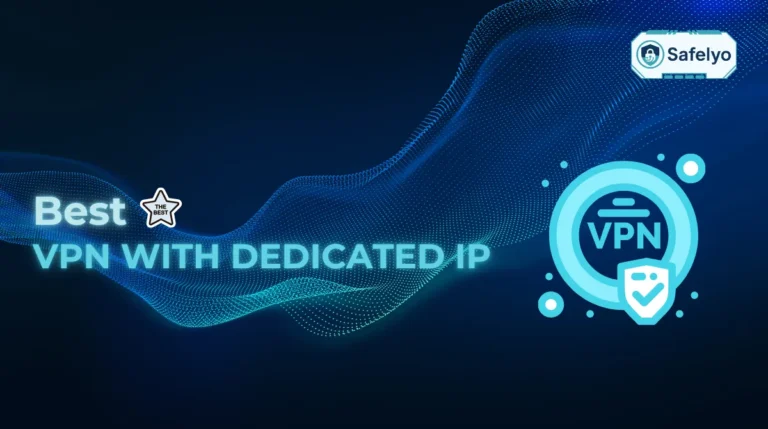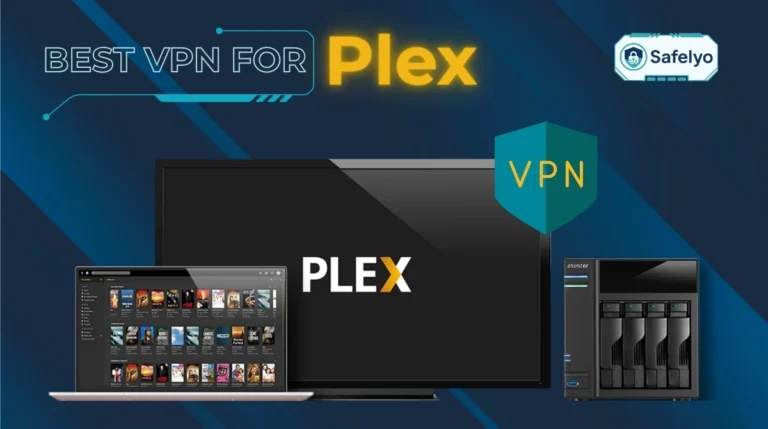In modern software development, finding the best VPN for API testing isn’t an afterthought – it’s a strategic move to ensure your API performs flawlessly for users worldwide. It’s the difference between hoping your code works globally and knowing it does.
As a developer, you’ve likely faced the classic challenges: how do you truly test geo-restricted logic from your desk? How do you verify that your API returns the correct currency in Germany or content in Japan when you only have one IP address? Mocking data can only take you so far, and it often misses the nuances of real-world network conditions.
I’ve spent years building and testing services that rely on global availability, and I know the frustration of chasing bugs that only appear for users in specific regions. A consumer-grade VPN designed for streaming won’t cut it. You need a tool built for a developer’s workflow, one with a robust command-line interface (CLI) and a diverse, reliable server network.
Key takeaways:
- The best VPN for API testing: NordVPN, Private Internet Access (PIA), ExpressVPN
- A VPN is essential for accurately testing geo-fencing, localisation logic, network latency, and IP-based rate limiting.
- For developers, the most critical features are a powerful CLI, a diverse server network, and the option for a static IP.
- NordVPN excels in automation, PIA offers great value with static IPs, and ExpressVPN provides unmatched simplicity for manual checks.
Stop mocking and start real-world testing. Let me guide you through the essential tools and workflows to bulletproof your API for a global audience.
1. The best VPNs for API testing in 2025
Now for the main event. We’ve taken the developer’s checklist and put the leading VPNs to the test, focusing specifically on their utility for API testing and automation workflows. We didn’t just look at speed charts or streaming capabilities – we got our hands dirty with their CLIs, integrated them into scripts, and evaluated how they perform in a real-world QA environment.
The following recommendations are for developers and QA engineers who need a reliable tool that integrates seamlessly into their work.
Here’s a quick overview of our top picks:
| VPN | Best For | CLI Support | Static IP | Server Spread |
|---|---|---|---|---|
| NordVPN | Automated Testing & CI/CD | Excellent | YES | 111 Countries |
| Private Internet Access (PIA) | Static IPs & Advanced Config | Very Good | YES | 91 Countries |
| ExpressVPN | Manual Testing & Reliability | Basic | NO | 105 Countries |
1.1. #1 – NordVPN
If you plan to integrate VPN connections into any form of automated script, NordVPN should be your first choice. Its power lies in having the most robust, well-documented, and reliable command-line interface (CLI) in the industry.
Key Specs for API Testing:
- Powerful & Reliable CLI: Easily script connections, disconnections, and server switches.
- City-Level Server Selection: Test with precision from specific metro areas (e.g., us-chicago).
- Dedicated IP Option: Get a clean, static IP for whitelisting in staging environments.
- CI/CD Ready: Rock-solid performance for integration into automated workflows.
BEST FOR
QA teams and developers who need to integrate location switching directly into their CI/CD pipelines and complex automated test scripts. The power and reliability of its CLI make it the undisputed king of automation.
From personal experience building out CI/CD pipelines, a flaky CLI is a dealbreaker. NordVPN’s CLI has consistently been the most dependable. It allows for simple, predictable commands like NordVPN connect to connect to Germany or NordVPN disconnect to end the session. These commands can be effortlessly called from a Python script using the subprocess module or a JavaScript test file using execSync. This is the foundation of true test automation.
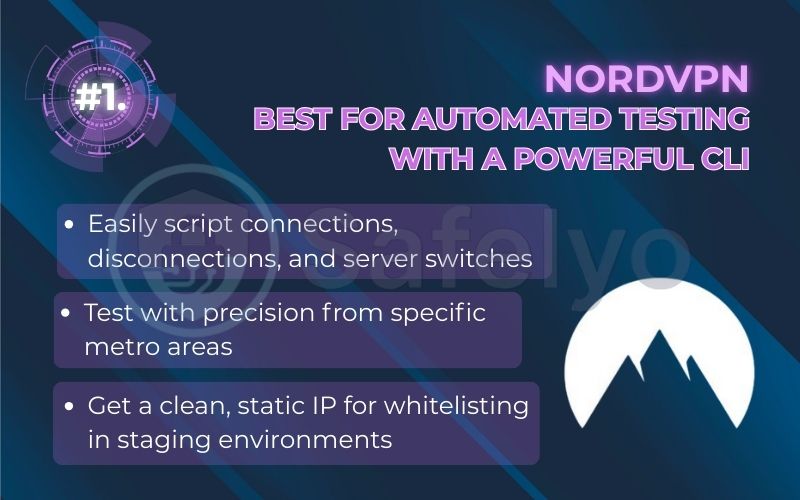
Beyond the CLI, its VPN server network is vast and granular. You don’t just get access to the “USA”; you can choose specific cities like us-new-york or us-seattle. This is incredibly useful. For instance, I once debugged an issue where API responses were slow only for users on the US West Coast. By using NordVPN to connect specifically to a Seattle server, I could replicate the exact latency conditions and solve the problem, something impossible with a less detailed server list.
NordVPN also offers a dedicated IP option, which is a lifesaver for staging environments. We assign a dedicated IP to our QA test runner, and that IP is whitelisted in our firewall. This prevents our automated tests from being blocked by security rules that might trigger on a shared, frequently changing VPN IP address.
NordVPN: The best for automated testing with a powerful CLI
>> Want a deeper dive into its CLI commands and performance benchmarks? Explore our full, in-depth NordVPN review for all the technical details.
3.2. #2 – Private Internet Access (PIA)
While NordVPN excels at pure automation, Private Internet Access (PIA) is the champion for developers who need a stable, affordable static IP and enjoy tinkering with advanced network settings.
Key Specs for API Testing:
- Affordable Dedicated IPs: Ideal for creating a stable, whitelisted staging environment.
- Advanced Port Forwarding: Allows for testing complex scenarios like webhooks.
- Full US State Coverage: Unmatched granularity for testing US-specific geo-logic.
- Scriptable CLI: Robust enough for most automated testing needs.
BEST FOR
Developers who require a reliable and cost-effective static IP for their staging servers, and for those who need advanced network configuration options like port forwarding for complex API testing.
PIA’s standout feature is its dedicated IP, which they offer at a very reasonable price. Think about your staging or UAT environment. You likely have it locked down, only allowing access from specific office IPs. A static IP from PIA gives your remote test runners a permanent, “trusted” address. I’ve used this to give a CI/CD runner a fixed IP, adding it to our firewall rules once and never having to worry about it being blocked again. It creates a clean and predictable testing environment.
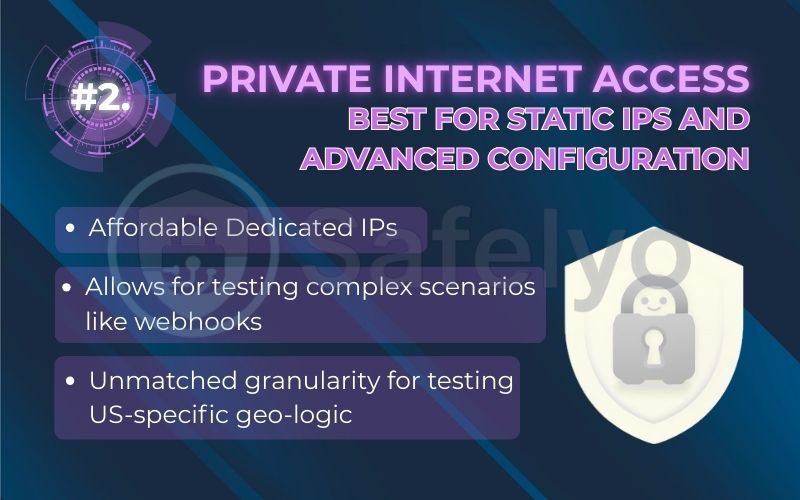
Their CLI, while maybe not as polished as NordVPN’s, is surprisingly powerful and highly scriptable. But where PIA really shines for technical users is its support for port forwarding. This is a game-changer for more complex scenarios, like testing webhooks. For example, if you need to test an API that sends a callback to your local machine, you can use PIA to forward traffic from a public port on their server directly to your localhost. It’s a niche feature, but for those who need it, it’s invaluable.
Furthermore, their server network is massive, and they have a unique advantage in the US market: Servers in all 50 States. This provides an unmatched level of granularity for testing state-specific logic, like sales tax calculations or compliance rules.
Private Internet Access (PIA): Best for static IPs and advanced configuration
>> To learn how to set up port forwarding and see its CLI in action, read our complete technical guide in the full Private Internet Access review.
1.3. #3 – ExpressVPN: Best for manual testing and reliability
Sometimes, you don’t need to run a full automated test suite. You just need a quick, reliable answer to a simple question: “Does the API return the correct data from a Japanese IP?” For these moments, ExpressVPN is the undisputed king of speed, simplicity, and reliability for manual testing.
Key Specs for API Testing:
- Blazing-Fast Connections: Minimises waiting time during manual tests.
- One-Click Simplicity: The most intuitive apps for quick location switching.
- High-Quality IP Addresses: Reduce the chance of being blocked by services.
- Reliable Performance: Extremely stable connections that won’t drop mid-test.
BEST FOR
Developers and QA engineers who frequently perform manual API checks and prioritize speed, ease of use, and rock-solid connection reliability above all else.
Its core strength is its “it just works” user experience. The desktop apps and browser extensions are incredibly intuitive. I often find myself reaching for ExpressVPN for quick sanity checks. The process is seamless: open the app, click “Tokyo,” and it connects in seconds. Then, I switch over to Postman or Insomnia, send my request, and get my validation instantly. There’s no friction, which is exactly what you want for rapid, iterative manual testing.
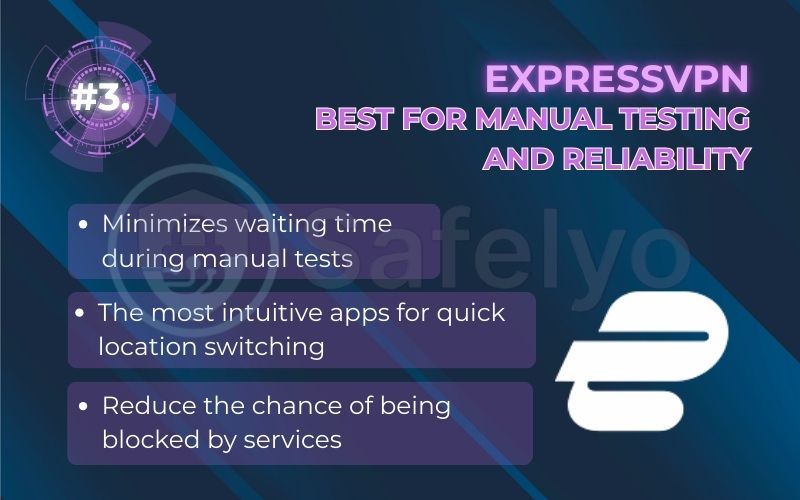
While its CLI isn’t designed for complex scripting like NordVPN’s, it’s perfectly functional for basic connect, disconnect, and list commands. It’s more than capable for a simple script that needs to check an endpoint from a few different locations.
The real hidden value of ExpressVPN for testers is the high quality of its IP addresses. They are rotated frequently and are less likely to be flagged or blocked by services with aggressive VPN detection. This means fewer failed tests due to a blocked IP and more accurate results, saving you the headache of figuring out if the problem is your code or the VPN server’s reputation.
ExpressVPN: Best for manual testing and reliability
>> Find out how its speeds stack up against the competition in our detailed performance analysis in the complete ExpressVPN review.
2. Why do you need a VPN for robust API testing
Truly robust API testing goes far beyond just confirming a 200 OK status code. It’s about ensuring a consistent and correct user experience for every single person, no matter where they are in the world. Your code might work perfectly on your local machine, but how does it behave when called from São Paulo, Sydney, or Seoul?
This is where a VPN becomes an indispensable part of your development toolkit. It allows you to move beyond assumptions and simulate real-world conditions. Here are the critical test cases that are nearly impossible to validate without one:
Testing geo-restricted content and logic.
This is the primary use case. A VPN lets you instantly check if your API correctly blocks requests from sanctioned countries or, conversely, serves specific content only to licensed regions. You can verify that it returns the right product catalogue for Europe and a different one for North America.
Verifying localized responses.
Does your API return the correct currency symbol (€, $, ¥), language, or date format based on the user’s location? A VPN places your digital self directly in that location, allowing you to validate that your localisation logic is working as intended.
Simulating network latency and performance.
A request from halfway across the globe will never be as fast as one from your local network. A VPN introduces realistic latency, allowing you to test how your API and the applications that consume it handle slower response times. This helps you identify potential timeouts and build more resilient user interfaces.
Validating IP-based rate limiting.
If your API limits the number of requests from a single IP address, how do you test it effectively? A VPN allows you to change your IP address in seconds, making it simple to confirm that your rate-limiting rules trigger and reset correctly.
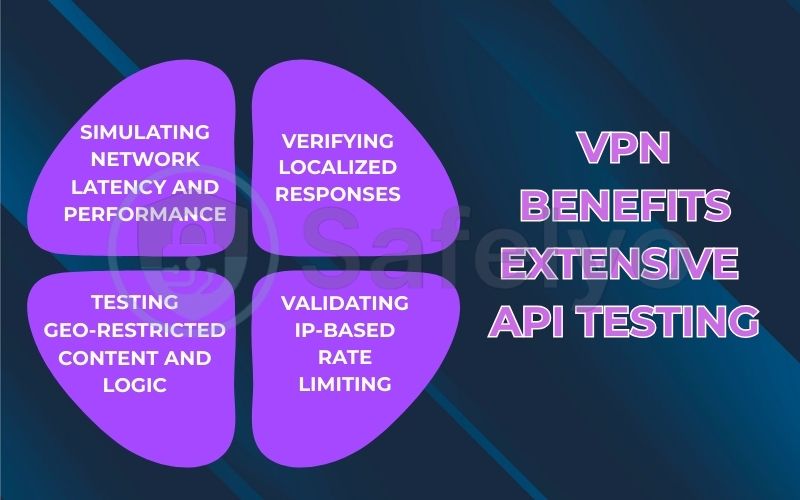
When developing Safelyo’s own services, we use a VPN daily to test our payment gateway API. We simulate requests from Europe to ensure GDPR-compliant data is returned, and from the US to verify that state-specific sales tax is calculated correctly. It turns abstract requirements into concrete, testable results.
2. Key VPN features checklist for API testers
When you’re picking a VPN for API testing, you throw the typical consumer checklist out the window. Your priorities shift from unblocking streaming services to enabling reliable, automated validation. A slick user interface is nice, but a powerful command-line interface is essential.
Based on my experience integrating these tools into production workflows, here is the developer’s checklist of features that truly matter. These are the non-negotiables that separate a developer’s tool from a consumer toy.
Command-line interface (CLI)
This is the single most important feature for automation. A robust CLI allows you to programmatically connect, disconnect, and switch servers directly within your automated test suites (like Jest or Pytest) and CI/CD pipelines. Without it, you’re stuck with manual testing.
Global server diversity (city-level is a plus)
You need more than just a list of countries. The ability to connect to specific cities (e.g., Ashburn, Virginia vs. Los Angeles, California) is crucial for accurately testing latency and region-specific behavior within a single country.
Static/dedicated IP availability
For consistent testing, especially in a staging environment, a static IP is invaluable. It provides a clean, stable IP address that you can whitelist and that won’t be blacklisted by other services, preventing false negatives in your security and access tests.
Speed and connection reliability.
A slow or flaky VPN doesn’t just make testing tedious; it makes it inaccurate. Unreliable connections can cause your tests to fail for the wrong reasons, wasting valuable time troubleshooting network issues instead of your own code.
Clear developer documentation.
A powerful CLI is useless without clear, comprehensive, and example-filled documentation. Good docs are a sign that the provider understands and supports a developer audience.
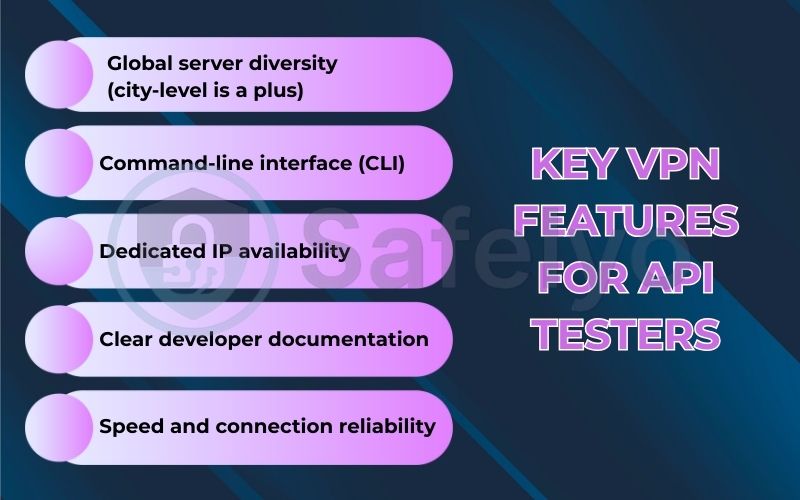
THE API TESTER'S VPN CHECKLIST
To help you evaluate your options, use this simple checklist when researching a VPN provider:
| Feature | Why It Matters for API Testing | Your VPN Choice |
| Command-Line Interface (CLI) | Essential for scripting and CI/CD integration. | 🗹 |
| Global Server Diversity (City-Level) | Accurately simulates users from specific regions. | 🗹 |
| Static/Dedicated IP Option | Provides a clean, stable IP for staging environments. | 🗹 |
| Connection Speed & Reliability | Prevents false negatives and ensures tests run fast. | 🗹 |
| Clear Developer Documentation | Saves time and makes CLI integration smoother. | 🗹 |
4. The API tester’s cookbook: VPN integration recipes
Theory is great, but practical, copy-paste-ready code is better. This section is your hands-on guide to integrating a VPN into your daily testing workflow. We’ll move from a simple manual check to fully automated scripts. Think of these as proven recipes I’ve used myself to catch geo-specific bugs before they hit production.
4.1. Recipe 0: Setting up your testing environment
Before we start coding, let’s perform our mise en place. A little prep work ensures the following recipes run smoothly. If you’ve already got your VPN’s CLI installed and configured, you can skip ahead.
This setup is a one-time process. Its goal is to get your machine ready for scripting.
- Install the VPN CLI. Most top providers offer a simple installer. For example, on a Debian/Ubuntu system, installing NordVPN is often as easy as running a command like sudo apt-get install NordVPN.
- Log in to your account. Once installed, you need to authenticate. Run the login command, for example: NordVPN login. This will typically open a browser window for you to sign in, linking the CLI to your subscription.
- Install your testing tools. Make sure you have the necessary libraries for your chosen language. For our recipes, you’ll need:
- Python: pip install requests
- Node.js: npm install -g jest (if not already installed)
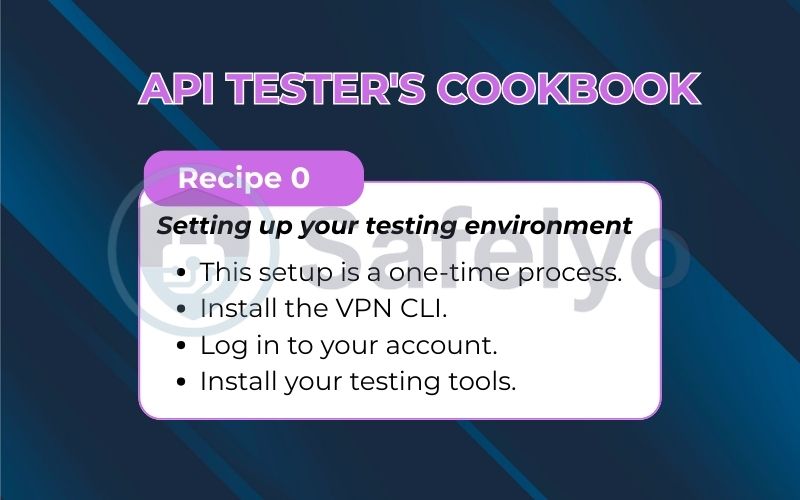
With that done, your environment is ready to go.
4.2. Recipe 1: Manual testing with Postman/Insomnia
This is my go-to method for a quick sanity check. It takes less than 30 seconds and is perfect for verifying a single endpoint from a specific location.
Scenario: You need to confirm that your API returns a Euro price (€) when called from Germany.
- Connect the VPN. Open your VPN app (ExpressVPN is fantastic for this because it’s so fast) and connect to a server in Germany.
- Set up your request in Postman. Open Postman (or Insomnia) and point it to your API endpoint. For this example, let’s use a public IP-checking API to prove it works: https://api.ipify.org?format=json.
- Send the request and verify. Hit “Send”. The response body should immediately show you an IP address geolocated in Germany. If you were testing your own product API, you’d check the response body for “currency”: “EUR”.
EXPERT TIP:
Don’t just check the response body. Inspect the request headers your API receives, too. Some applications rely on headers like X-Forwarded-For or a cloud provider’s geo-header (e.g., CloudFront-Viewer-Country). Confirming that these headers reflect the VPN’s location is a crucial part of a thorough test.
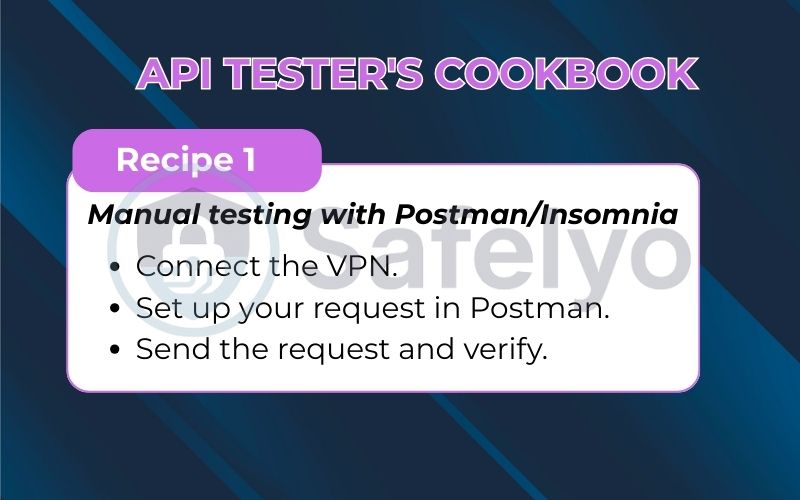
4.3. Recipe 2: Automated testing with Python & requests
Now let’s automate the process. This Python script is a basic but powerful example of how to loop through a list of countries, run a test for each one, and report the results.
Scenario: Run a nightly script to ensure your API’s main endpoints are accessible from the US, Germany, and Japan.
<> Pythonimport subprocess
import requests
import time
# List of countries to test (using NordVPN country codes)
TARGET_COUNTRIES = ["us", "de", "jp"]
API_ENDPOINT = "https://api.ipify.org?format=json"
def run_test(country_code):
"""Connects to a country, calls the API, and asserts the location."""
try:
print(f"--- Testing from {country_code.upper()} ---")
# 1. Connect to the VPN
print(f"Connecting to {country_code}...")
subprocess.run(["nordvpn", "connect", country_code], check=True, capture_output=True, text=True)
time.sleep(5) # Give the connection a moment to stabilize
# 2. Make the API request
print(f"Pinging {API_ENDPOINT}...")
response = requests.get(API_ENDPOINT, timeout=15)
response.raise_for_status() # Raise an exception for bad status codes
ip_address = response.json()["ip"]
print(f"Success! Got IP: {ip_address} from {country_code.upper()}")
# In a real test, you would assert a specific condition here
# assert "expected_data" in response.text
except (subprocess.CalledProcessError, requests.RequestException) as e:
print(f"ERROR during test for {country_code.upper()}: {e}")
finally:
# 3. Always disconnect to ensure a clean state for the next run
print("Disconnecting...")
subprocess.run(["nordvpn", "disconnect"], check=True)
time.sleep(2)
# Run the test for each country
for country in TARGET_COUNTRIES:
run_test(country)
What this script does: It programmatically calls the NordVPN CLI, waits for the connection, calls our test API, and then – crucially – uses a finally block to guarantee it disconnects, even if the API request fails. I use a similar, more advanced version of this script in a scheduled job to monitor our key services from different continents every hour.
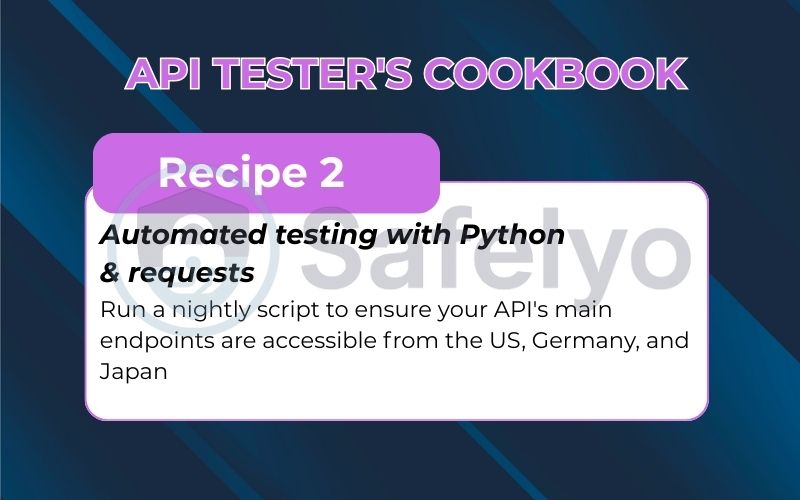
4.4. Recipe 3: Integrating into a Jest test suite
For frontend or full-stack developers, running API tests within your existing JavaScript test suite is ideal. Jest’s beforeAll and afterAll hooks are perfect for managing the VPN connection.
Scenario: Before running your API integration tests, connect to a server in the UK to test GBP currency formatting.
<> JavaScript// my-api.test.js
const { execSync } = require('child_process');
const fetch = require('node-fetch'); // Make sure to install node-fetch
const API_ENDPOINT = 'https://api.ipify.org?format=json';
const VPN_LOCATION = 'gb'; // United Kingdom
describe('API Tests from the UK', () => {
// Connect to the VPN before any tests in this file run
beforeAll(() => {
console.log(`Connecting to VPN location: ${VPN_LOCATION}...`);
execSync(`nordvpn connect ${VPN_LOCATION}`);
console.log('VPN Connected.');
}, 30000); // 30-second timeout for the connection
// Disconnect after all tests in this file have finished
afterAll(() => {
console.log('Disconnecting VPN...');
execSync('nordvpn disconnect');
console.log('VPN Disconnected.');
}, 30000);
test('should return a UK-based IP address', async () => {
const response = await fetch(API_ENDPOINT);
const data = await response.json();
console.log('Received IP:', data.ip);
// In a real test, you'd verify the country using an IP lookup service
// or check for UK-specific data in your own API's response.
expect(data.ip).toBeDefined();
});
});
Why this pattern is so effective: By wrapping the tests with beforeAll and afterAll, you create a clean, controlled environment. All tests inside this describe block will automatically run through the UK server without you needing to manage the connection in each individual test. This pattern keeps your test code clean and focused on validation logic.
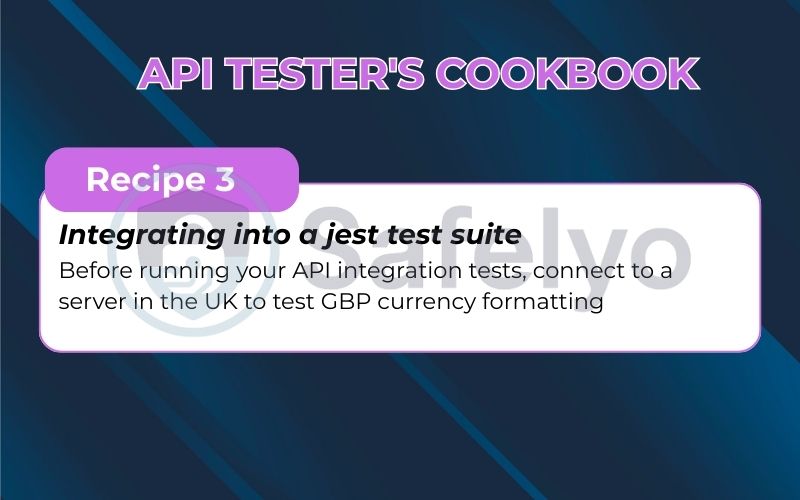
5. FAQ about the best VPN for API testing
Here are some of the most common technical questions I’ve encountered from developers and QA engineers when they first start using a VPN for API testing. These quick answers will help you navigate some of the finer points of integrating this tool into your workflow.
What’s the best VPN for API testing?
The answer depends on your primary need. For automation and CI/CD integration, NordVPN is the best due to its powerful and reliable command-line interface (CLI). For developers needing a stable, affordable static IP for staging environments, Private Internet Access (PIA) is the top choice. For quick, reliable manual testing, ExpressVPN’s speed and simplicity are unmatched.
Can I use a VPN to test my API on a local development server (localhost)?
Yes. Most modern VPNs with a split tunneling feature allow you to exclude traffic to localhost. This means you can route all your outgoing test requests through the VPN to an external endpoint (simulating a user) while still accessing your local server directly without interference.
VPN vs. proxy services: Which is better for API testing?
For most testing scenarios, a VPN is superior as it routes all traffic from your machine through the tunnel, accurately simulating a user’s entire network environment. Proxies operate at the application level. While they can be simpler for very high-volume, automated tasks like web scraping, a VPN provides a more realistic and comprehensive test of a genuine user’s connection.
Will a VPN CLI return proper exit codes for scripting?
Yes, a well-designed CLI (like those from NordVPN or PIA) will return non-zero exit codes on failure (e.g., connection failed). This is absolutely crucial for scripting, as it allows your automated tests to check the exit code and handle errors gracefully instead of continuing with a failed or incorrect connection.
How does a VPN’s kill switch affect automated API tests?
A kill switch is vital. If the VPN connection drops mid-test, the kill switch will block all internet traffic. This causes your API request to fail immediately instead of leaking your real IP address to the endpoint. This ensures your tests either run correctly through the VPN or fail safely, preventing inaccurate results from a compromised test environment.
Can I use one VPN to test requests from multiple locations simultaneously?
Not with a single VPN connection on one machine. A standard VPN routes all traffic from your device through one server at a time. To test simultaneously, you would need to use multiple machines (or virtual machines/Docker containers), each running its own independent VPN connection to a different location.
6. Conclusion
Choosing the best VPN for API testing elevates your quality assurance process from guesswork to a precise, data-driven methodology. It’s the critical step that bridges the gap between how your API works on your machine and how it performs for your actual users across the globe. By simulating real-world conditions, you build more robust, reliable, and globally-aware applications.
Don’t wait for users to report location-specific bugs. Build more resilient and globally-aware APIs by integrating real-world location testing into your development lifecycle today. Explore our detailed technical breakdowns and copy our ready-to-use code recipes from the definitive guides of Safelyo in the Best VPN category.

